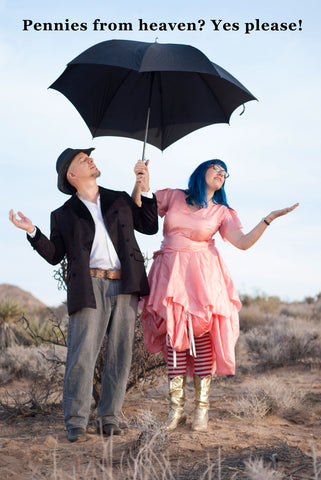 *deep breath*
*deep breath*
I'm about to let you in on a little secret: starting an online business is painfully easy. It's mind-bendingly easy. It's confusingly easy.
"Confusingly easy, you say?" you say. "Is that even possible?"
Yes, my friend. It's confusingly easy because I can't figure out why everyone isn't doing it.
You don't need a fancy website, a business plan, or even a DBA. You just need figure out how to mail items, and then think of something you're really passionate about, whether that's vintage clothes, old books, handmade jewelry, or even crocheted bags of dicks.
You know how to mail stuff? Holy soap, this is business is almost going to make itself!
The way I see it, everyone has a business inside them waiting to be launched -- nay, clawing its way through your stomach into your brain. And you just have to decide to do it.
1. come up with an idea
It's no secret that we weren't soap people before we came up with the idea for the business. So if you think, "Well, I'm interested in [old books/taxidermy/barrettes made from taxidermy and old books], but I don't know anything about it," SO WHAT?
There has never been a time in history better than now to be interested in something. Almost everything (except book-owl taxidermy barrettes, apparently) has been researched and written about in far more detail than you'll ever need to start a business.
Know how I got my fancy business start with this here business? I Googled "How to start a soap business." The first result - literally a blog post from a label company - gave me contacts, suppliers, and more. I still use some of those vendors to this day.
Afraid your idea isn't unique? SO WHAT? Think I was the first person to ever invent soap? (omg can you imagine how awful everyone would have smelled and how rich I would be?)
The important thing is that YOU are unique (which you are, by the way) and you are ok sharing who you are with other people. Seriously, that's it. You have your own take on literally everything you know, see, feel, and make, and even though people might relate to your take on stuff, no one has exactly the same view.
Is it scary to share who you are with the world? Yes. Absolutely. It's very scary. Because what if you get out there and no one likes you, your products, your worldview, your everything?
We deal with that all the time. Our stuff isn't for everyone. I'm not for everyone. Russ is not for everyone. But, as the old saying goes...
"I'd rather be someone's shot of whiskey than everyone's cup of tea."
I've heard some people say, "Oh! I love your business! I love what you do! I was going to do exactly the same thing!" ... first, if you do exactly the same thing, I will find you and I will feed you a fistfull of bacon soap shavings. Second, even if you wanted to, you couldn't do the same thing! You just wouldn't be able to. Not because what I do is hella hard or special, but because I'm constantly out here being me and doing stuff and making stuff that's my me thing, and you'd die trying to keep up trying to be someone else.
You do you. It's so much easier. Who needs the stress of pretending to be someone else? Not you!
2. acquire the thing you want to sell
This is deceptively easy.
NO IT ISN'T! IT'S JUST EASY.
Either buy it or make it.
How much stock should you have? How do you know what things will sell and what won't? Don't you need a marketing plan? A stock room? Inventory? What if you sell out? Won't people be frustrated? None of that matters. People use those questions as excuses to delay getting their product out there.
We started with eight bars of Unicorn Poop when we launched. They sold out in about two hours. Were people disappointed? Of course they were! But they also knew they had to be serious about jumping on that beautiful fecal rainbow in the future! (haha... sometimes I really love writing.)
Some books (like the 4 Hour Workweek) advocate not even having a product to sell. Can you think of anything easier than not having a product? I KNOW! They recommend that you test your market by setting up some inquiry pages and looking at traffic to those pages.
That seems too complicated for what we're trying to do here. What we want is a product for sale so someone can trade you money for it.
3. think of a name for your business
This can be important, or it doesn't have to be. Do you want to actually start a business here or just make some greenbacks on the side?
We're operating on the assumption that this is a side project, so it doesn't matter as long as it's not overtly offensive (unless your product is porn, which gives you a little more leeway).
Let's call it Taxidermy & Vintage Books Headwear for now.
Do a search for the name just to make sure no one is obviously using it (which can get you in trouble at any size). Amazingly, "Taxidermy & Vintage Books Headwear" is not taken!
If you're feeling really ambitious, check out whether the domain name is available by going to Godaddy and searching. You don't have to buy it (though you might get so excited that you do anyways).
Why not just use your name and add "store" to the end? Well, there are a few reasons. First, people are going to be searching for "taxidermy books" and stuff like that, and we want them to find your store. Second, if you want to go big with this someday, "Annie Miller's Store" is not going to scale well... meaning that you will have a hard time getting employees and customer service reps and hiring sales reps to sell "Annie Miller's Store" stuff. People will always be wanting to talk to THE Annie Miller. And if you ever want to sell the business (hey, pie in the sky...), it's not going to be possible to sell "Annie Miller's Store" without, in some part, selling Annie Miller.
(for the record, I don't know any Annie Millers)
4. decide where to sell your item(s)
Small-scale handmade stuff? Etsy's a good place to start.
Vintage or re-used stuff? eBay will be your place.
Other stuff? We use Shopify, but there are other services like BigCommerce, WooCommerce, SquareSpace, etc.
When someone asks me how to start a business (as they sometimes do), I tend to urge them to establish their brand and get a platform far away from Etsy, eBay, or Amazon, since people just lump everything on those sites together. (think of when you ask someone where they got a thing... do they say "Oh, I got it on Etsy!" or "I got it from the Etsy seller AnniesDelightfulLatchhooks"? It's just not possible to create a unique brand on Etsy)
But we're not starting a business, we're selling a thing. Etsy and eBay (and some of the other site services) mean you don't have to figure out credit card processing or any of that. Delightful!
5. price your item
This is probably the most important part of this whole thing, but one that a lot of people kind of skim over. Almost everyone under-charges for their stuff. Do not do that.
I wrote a huge-ass article about pricing for Pyragraph, but I'm going to sum it up for you here:
PRICE = {[cost of materials] + [(# of hours spent) x (your hourly pay)]} x 2.5
Tada! Ok, so that's a super basic and simple formula for what really is quite a huge science and is very important. But if we're just going for BAM! ONLINE STORE! BAM! SALE!, it's a handy formula.
So if the cost of our materials is $2 and we spend 15 minutes on it at $15/hour ($3.75), that's $5.75 cost. Multiply that by 2.5 (a very rough estimate of profit and overhead), and you get $13.12.
Now, if your main job is Director of Programming for ABC or something, and your salary breaks down to an hourly rate of about $100/hour, crafting is probably not going to be a great additional source of income for you. But we're not really talking about "a source of income," we're talking about some dollars here and there.
If you're hella broke, you can hustle up some money on the side pretty easily and without a ton of commitment. Plus, if you're already having fun doing it, then it's kind of an awesome win.
If you are going to do wholesale or actually start a business, again, this is not for that. Go read the pricing article.
6. photograph your item(s)
Have a phone? That camera is totally fine for taking product images!
But don't just set your item on your messy coffee table and take a quick snapshot, hoping that potential buyers will ignore the dirty fork and unopened stack of mail (or maybe that's just my coffee table).
Naturally, there are a bazillion resources for how to take product photos with your phone.
(in case you think I'm an asshole for always using "Let me google that for you" links 1. you might be right, but I pronounce it "smartass whole," and 2. I just want to show you that seriously every thing you could ever want to know is just that easy.)
A product photo should show off the item with few distractions.
We happen to have a very good friend who takes all our product photos professionally, but again, we're not starting a full-fledged business in this blog post, we're selling a thing.
7. write some stuff
This is the trickiest part for me, because I am obsessed with writing.
I'm taking a great online class called The Six Appeal Process, and one of the core principles is writing about what the item will do for the potential buyer, not writing at all about what the item is (or almost... I mean, you might have to list ingredients or something). This makes ownership of the object more tangible.
So, for example, instead of "3 inch taxidermy mouse skull with miniature 'Leaves of Grass' first edition book, mounted on a metal hair comb," write "For the literary lady... The mouse (we'll call him Al), will whisper sweet poetry to you as you dance with shadows in the moonlight attic of your Victorian home. This one-of-a-kind, handcrafted gem will bring you years of delight and decades of memories."
Yeah, that's not the best, but you get the idea. This is your business, not mine. You should write about things that are meaningful to you.
If you're making certain items (soap, for example), you will have to adhere to regulations. But I bet you found those in your initial "I wonder what I have to know to start an xyz business" search.
8. publish the thing and let your friends know you published it
If you're afraid that people will not like that you're posting something for sale on your personal facebook timeline, trust me, if you only do it once or twice, people will not care. In fact, they'll probably just buy your thing.
And voila. You have sold a thing.
Now mail it and get or make another one. TADA! You're in business!
All the rest of the stuff
Ok, yes, there are many, many, many more things about running a business and selling online than I'm ever going to be able to cover, let alone in a single blog post.
You'll also have to report your earnings in your taxes, but thankfully, there are several handy guides about that.
But honestly, all these steps can take under one day (especially if you have the thing), and you can sell the thing tomorrow. And then make another one, and another, and another.
Again, there has never been a better time to do this
You have nearly unlimited resources to start a business with absolutely zero overhead, start-up costs, red tape, etc.
And you never know... someday, you might decide to do it full time and be your own entrepreneur!
Ok, comment gallery...
I know I vastly over-simplified having an online business. But don't just criticize this post, give other people a hand!
What do you wish you knew when you started selling stuff online? Was it hard to get started?




